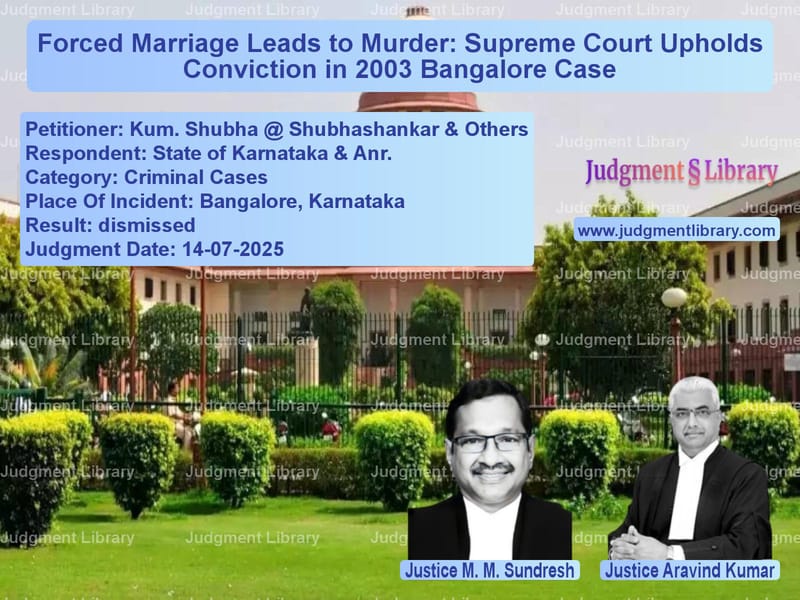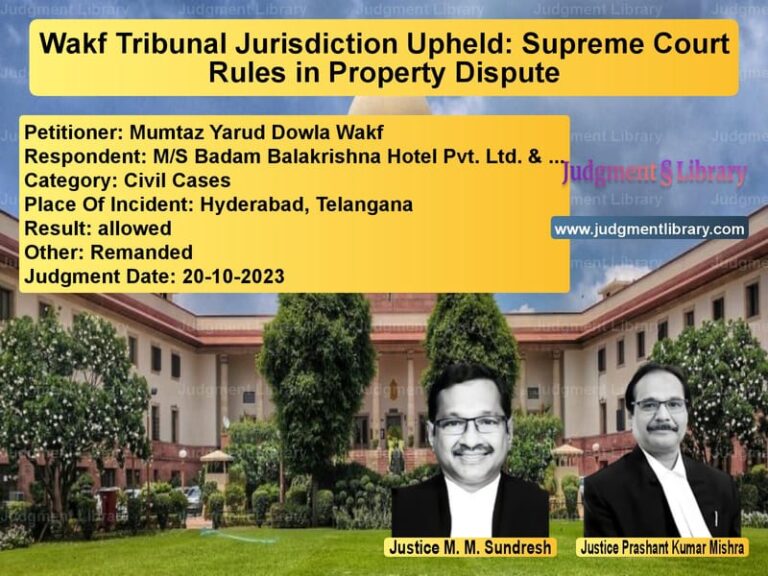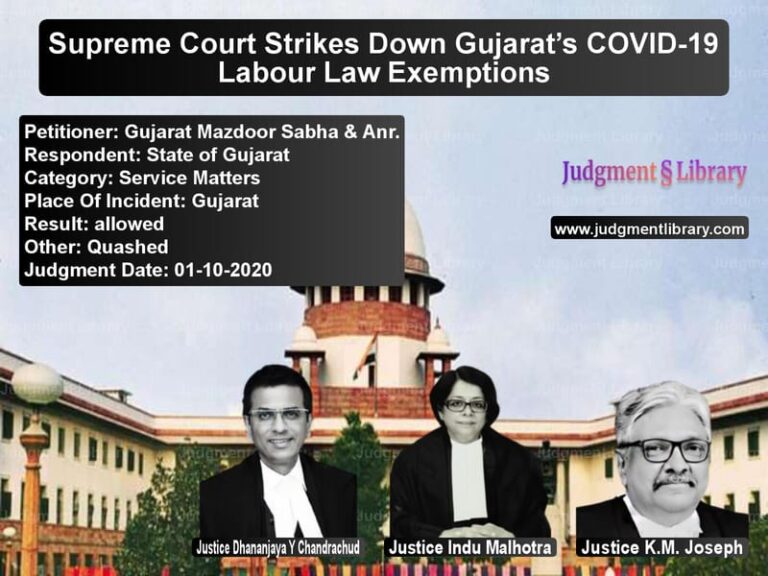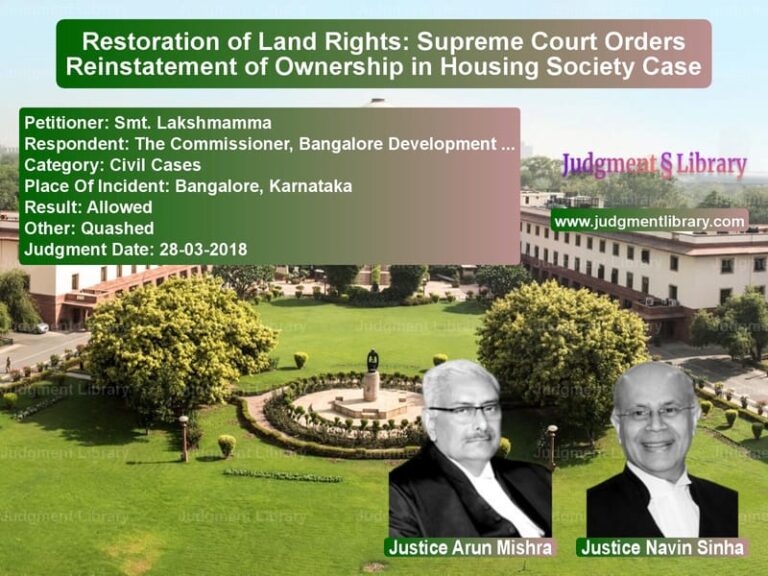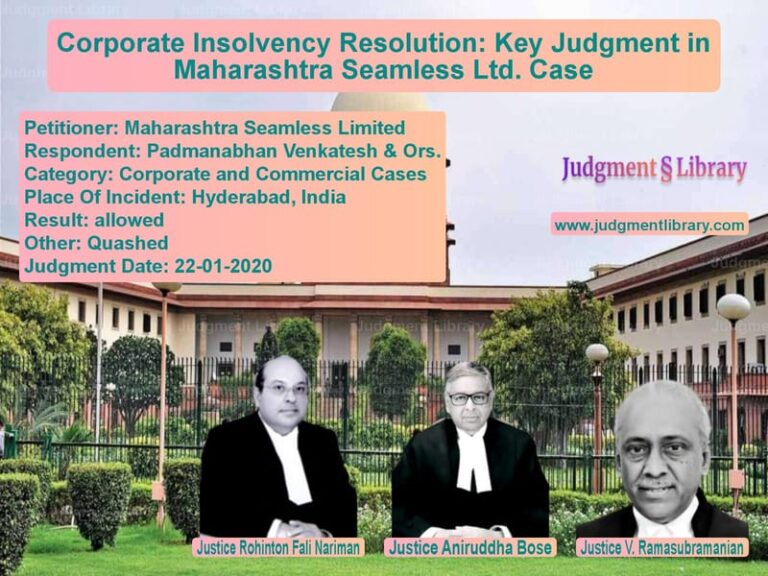Forced Marriage Leads to Murder: Supreme Court Upholds Conviction in 2003 Bangalore Case
In a tragic case that unfolded in Bangalore during December 2003, the voice of a young ambitious girl was muffled by a forced family decision, creating the fiercest of turmoil in her mind. This, backed by an unholy alliance of mental rebellion and wild romanticism, led to the tragic murder of an innocent young man, while simultaneously destroying the lives of three others. The Supreme Court recently delivered its judgment on this heartbreaking case that began nearly two decades ago.
The Court began its analysis with profound observations about crime and its causes. “A crime constitutes a mental rebellion of norms and rules that have been created for the establishment of social order. It can be described as a deviant behavior, triggered by causes which are both distant and immediate.” The judgment delved deep into the psychology behind criminal behavior, noting that “It is the strained mind, irked by alienation and material deprivation, that ignores the moral stage, all while focusing on the avoidance of punishment.”
The Court specifically examined crimes committed by women, observing that “A woman is pushed into a dark corner by external elements, that contribute substantially to the inequalities in her life.” The judgment painted a vivid picture of the predicament faced by young women in traditional settings: “A forced marriage, divorcing her from her professional ambitions and curtailing her further education, would certainly warrant a reaction.”
The factual background revealed a heartbreaking story. Shubha Shankar (A-4), a 20-year-old law student, had her marriage arranged with B.V. Girish, a 26-year-old software engineer at Intel. Both families were residents of the same locality in Bangalore and had long-standing cordial relations. The engagement ceremony took place on November 30, 2003, with marriage scheduled for April 11, 2004.
Just two days after the engagement, on December 3, 2003, Shubha asked Girish to take her for dinner at T.G.I. Friday’s Hotel near his workplace. After dinner, between 9:30 PM and 9:40 PM, they stopped at the “Air View Point” on Airport Ring Road to watch airplanes landing. Tragically, Girish received fatal injuries to his head from an unknown assailant using a steel rod. Shubha, with help from passers-by, rushed him to Manipal Hospital where he was declared dead the next morning at 8:05 AM.
The prosecution’s case was that Shubha was unwilling to marry Girish and had expressed her grievance to her close friend Arun Verma (A-1). Arun sought help from his cousin Dinesh (A-3), who roped in his friend Venkatesh (A-2) to eliminate Girish. The four accused conspired to commit the murder.
The appellants’ legal team presented several arguments challenging the evidence. They contended that the eyewitness testimonies of PW-15 and PW-16 were unreliable as planted witnesses. “The conduct of PW-15 also makes it difficult to believe his presence at the place of occurrence as, instead of informing the police regarding the incident, PW-15 took the scooter of the deceased to his house, leaving behind his own two-wheeler with PW-16.” They also challenged the motive evidence, stating that “The evidence adduced by PW-8 is wholly unreliable being contrary to the evidence of PW-9, PW-10, PW-12, PW-6 and PW-31.”
Regarding the crucial Call Detail Records (CDR), the appellants argued that “The reliance placed by the Courts below on the CDR, has no legal basis. The witnesses who deposed in support of the CDR, being PW-24 and PW-25, were not competent to do so.” They also challenged the recovery of the murder weapon, stating that “The link required under Section 27 of the IEA is missing as the panch witnesses to the recovery of M.O.11 cannot prove whether the recovery was made pursuant to the disclosure statement of the accused.”
The respondents countered that despite material discrepancies, the evidence as a whole proved guilt. They maintained that “The presence of A-4 at the place of occurrence is not in dispute. It is a fact which has also been proved by the evidence of PW-5, PW-6, PW-10 and PW-12, supported by the Accident Register.” They argued that “The testimonies of eye-witnesses PW-15 and PW-16 are consistent with the medical evidence available on record.”
The Supreme Court conducted an extensive analysis of the evidence, beginning with the eyewitness testimonies. The Court found serious issues with their credibility: “The more closely we scrutinize the testimonies of these witnesses, the less we find ourselves relying on them. This is due to their unnatural conduct and the material discrepancies found between their testimonies.” The Court noted that PW-15, despite being an ex-serviceman and eyewitness, did not report the incident to police and strangely took the deceased’s scooter home.
Having discarded the eyewitness accounts, the Court treated the case as one of circumstantial evidence and applied the five golden principles from Sharad Birdhichand Sarda v. State of Maharashtra. The Court emphasized that “When a case is founded on circumstantial evidence, it is imperative to establish the motive of the accused to commit the offence. This is because it serves as the foundation of the evidentiary chain that ultimately leads to the implication of the accused.”
The Court found the evidence of PW-8 and PW-11 unreliable due to contradictions and delays in recording their statements. However, the Court placed reliance on PW-23, Pramod Dixit, who testified that Shubha had confided in him about her unwillingness to marry Girish due to lifestyle differences. “We are inclined to rely much on this evidence, as we find it to be natural. This is owing to the fact that unlike the aforementioned witnesses, there is nothing on record to show that PW-23 had any prior relationship with the family of the deceased.”
The most compelling evidence came from the Call Detail Records, which the Court analyzed in meticulous detail. The CDR revealed an astonishing pattern of communication between the accused. “Between A-1 and A-4 alone, there were 54 communications, of which 45 were SMSes and 9 were voice calls.” The Court noted the striking contrast in Shubha’s communication patterns: “While one would expect a rise in communication between the deceased and A-4 after their pre-engagement rituals, the call records exhibit a completely different story.”
The Court made crucial observations about the day of the murder: “It is rather strange that A-4 was continuously exchanging messages with A-1, during the entire period that she was with the deceased, who was her fiancé at the time. This lends credence to the case of the prosecution that she was giving information to A-1 regarding their whereabouts.” The pattern was particularly suspicious between 6:37 PM and 9:39 PM, when “A-1 and A-4 have exchanged 38 SMSes continuously, one after the other, with an average gap of only 2-7 minutes in between each message.”
The Court found the sudden silence in communications telling: “After the last communication between A-1 and A-4 at 09:39 PM, there is complete silence with no communication between any of the accused until 09:56 PM, when A-4 informed her father about the incident. The sudden silence between the accused during this crucial period lends credence to the theory put forth by the prosecution that the murder of the deceased was committed by the accused persons in conspiracy.”
The Court upheld the recovery of the murder weapon (steel rod) and the scooter used in the crime, rejecting the defense arguments. The Court also noted Shubha’s suspicious conduct in deleting messages from her phone, observing that “PW-33, being the technical expert, has also affirmed that the messages on the phone can only be deleted by manual operation. If the said messages were exchanged between the accused for any other bona fide purpose, then it was incumbent upon the accused to explain the same before the Court, which they have failed to do.”
The Court concluded that “the link for circumstantial evidence stands connected and proved, as the motive has been duly established through the evidence of PW-23, the voluminous CDR stands proved through the evidence of PW-24 and PW-25 who withstood a lengthy and exhaustive cross-examination, and the recovery of the weapon also stands proved.”
However, the Court did not end with merely upholding the conviction. Recognizing the human tragedy underlying the legal case, the Court made compassionate observations: “Considering that we started our discussion keeping in mind that this unfortunate event would not have occurred, had the family been more sympathetic in understanding the mental predilection and disposition of A-4, it is important for us to make certain observations. Ultimately, A-4 was unable to make a decision for herself, despite being an individual who had attained majority.”
The Court noted the passage of time and the transformation of the accused: “The appellants, who committed the offence with adrenaline pumping in their veins, have now reached the middle age. Two out of the four accused persons were teenagers at the time of occurrence, while A-4 had barely crossed that phase.” The Court concluded with a humanitarian gesture: “In light of the same, we would like to facilitate the appellants’ right to seek pardon by permitting them to file appropriate petitions before His Excellency the Hon’ble Governor of Karnataka.”
The Court granted eight weeks for the appellants to seek pardon under Article 161 of the Constitution and suspended their sentence until these petitions are decided. While upholding the legal guilt of the accused, the judgment acknowledged the complex social and psychological factors that led to the tragic events, offering a nuanced perspective on crime, punishment, and redemption.
Petitioner Name: Kum. Shubha @ Shubhashankar & Others.Respondent Name: State of Karnataka & Anr..Judgment By: Justice M. M. Sundresh, Justice Aravind Kumar.Place Of Incident: Bangalore, Karnataka.Judgment Date: 14-07-2025.Result: dismissed.
Don’t miss out on the full details! Download the complete judgment in PDF format below and gain valuable insights instantly!
Download Judgment: kum.-shubha-@-shubha-vs-state-of-karnataka-&-supreme-court-of-india-judgment-dated-14-07-2025.pdf
Directly Download Judgment: Directly download this Judgment
See all petitions in Murder Cases
See all petitions in Judgment by M.M. Sundresh
See all petitions in Judgment by Aravind Kumar
See all petitions in dismissed
See all petitions in supreme court of India judgments July 2025
See all petitions in 2025 judgments
See all posts in Criminal Cases Category
See all allowed petitions in Criminal Cases Category
See all Dismissed petitions in Criminal Cases Category
See all partially allowed petitions in Criminal Cases Category

